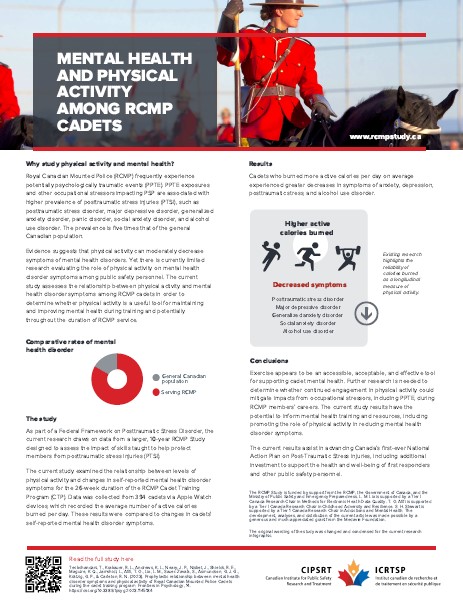Research Summaries
Why was the study done?
Public safety personnel (PSP) frequently experience potentially psychologically traumatic events (PPTE) as a result of service. The PPTE exposures and other occupational stressors impacting PSP are associated with higher prevalence of posttraumatic stress injuries (PTSI), such as posttraumatic stress disorder (PTSD), major depressive disorder (MDD), generalized anxiety disorder (GAD), panic disorder (PD), social anxiety disorder (SAD), and alcohol use disorder (AUD). The prevalence is five times that of the general Canadian population.
Physical activity has been reported to moderately decrease symptoms of mental health disorders such as PTSD, MDD, GAD, PD, SAD, and AUD. There is currently limited research evaluating the role of physical activity on symptoms of mental health disorder among PSP. The current study was designed to assess the relationship between physical activity and reported mental health disorder symptoms of RCMP cadets to determine whether physical activity may be a beneficial intervention or addition to mental health training for cadets, and potentially, for other PSP.
What was done in the study?
The current research is part of a larger study designed to assess the impact of skills taught to help protect RCMP members at risk for PTSI. A research summary of the previously published Study Protocol can be read here.
The study examined the relationship between levels of physical activity and changes in self-report mental health disorder symptoms from the start of the RCMP Cadet Training Program (CTP) to graduation from the program 26 weeks later. Based on previous research, physical activity was expected to be inversely associated with changes in mental health disorder symptoms of mood-, anxiety-, and trauma-related disorders.
The study included data from 394 cadets (76.1% male). The researchers assessed for associations between the average number of active calories burned per day as recorded by Apple Watches, and changes in self-reported mental health disorder symptoms of posttraumatic stress injuries (PTSI), such as posttraumatic stress disorder, major depressive disorder, generalized anxiety disorder, panic disorder, Social Anxiety Disorder, and alcohol use disorder.
What did we find out?
Cadets who burned more active calories per day on average reported greater decreases in anxiety symptoms from the start of the CTP to the end, greater decreases in their depression symptoms, greater decreases in their posttraumatic stress disorder symptoms, and greater decreases in their alcohol use symptoms. There was no statistically significant relationship between panic disorder symptoms and physical activity among participating cadets.
Where do we go from here?
The evidence highlights the need to research whether continued engagement in physical activity mitigates impacts from occupational stressors, including PPTE, during RCMP members’ careers. Additional research into the relationships between mental health symptoms and physical activity may provide further evidence for the use of exercise as a tool for maintaining and improving mental health during the CTP and throughout RCMP service. Exercise appears to be an accessible, acceptable, and effective tool for supporting cadet mental health.
The results help to continue advancing Canada’s first-ever National Action Plan on Post-Traumatic Stress Injuries, underscoring the need for additional investments to support the health and well-being of first responders and other public safety personnel.
The RCMP Study is funded by support from the RCMP, the Government of Canada, and the Ministry of Public Safety and Emergency Preparedness. L. M. Lix is supported by a Tier I Canada Research Chair in Methods for Electronic Health Data Quality. T. O. Afifi is supported by a Tier I Canada Research Chair in Childhood Adversity and Resilience. S. H. Stewart is supported by a Tier 1 Canada Research Chair in Addictions and Mental Health. The development, analyses, and distribution of the current article was made possible by a generous and much-appreciated grant from the Medavie Foundation.
The original wording of the study was changed and condensed for the current research summary.
Original study
Teckchandani, T., Krakauer, R. L., Andrews, K. L., Neary, J. P., Nisbet, J., Shields, R. E., Maguire, K. Q., Jamshidi, L., Afifi, T. O., Lix, L. M., Sauer-Zavala, S., Asmundson, G. J. G., Krätzig, G. P., & Carleton, R. N. (2023). Prophylactic relationship between mental health disorder symptoms and physical activity of Royal Canadian Mounted Police Cadets during the cadet training program. Frontiers in Psychology, 14. https://doi.org/10.3389/fpsyg.2023.1145184
Prepared by T. Teckchandani
